
“The first step in liquidating a people is to erase its memory. Destroy its books, its culture, its history. Then have somebody write new books, manufacture a new culture, invent a new history. Before long, that nation will begin to forget what it is and what it was ... The struggle of man against power is the struggle of memory against forgetting ... The worst thing is not that the world is unfree, but that people have unlearned their liberty.”
Milan Kundera, a French author and thought leader born in then Czechoslovakia, penned these words in the darkest period before the fall of the oppressive Soviet regime.
We might benefit from reflecting on his wisdom at this time in the life of our nation.
As we reel from the combined onslaught of brutal violence against women and children, and widespread public violence and contempt in our cities that is destroying livelihoods, properties and human lives, we need to ponder how we got to this place.
How have we unlearnt our liberty in just 25 years?
How did a people that mobilised effectively and successfully against a brutal apartheid regime erase their memories of that victory?
How did a people that built a vibrant social movement based on reawakening their consciousness of who they are as men, women and young people with a rich heritage lose their sense of identity as Africans?
How did a people that invested in the solidarity of all freedom-loving citizens across the divide-and-rule tactics of the enemies of freedom allow themselves to erase the memories of this heroism?
How did a people that organised poor communities across the country into powerful street committees, ward councils, village councils, women’s movements, youth groups, civic organisations, faith-based communities and workers’ unions – against all odds – become passive spectators of the looting of state resources and become complicit in xenophobic and femicidal acts?
As I listened, on one hand, to former president Jacob Zuma and some ANC people singing the praises of Gavin Watson at his funeral last week, and, on the other hand, to the revelations during the Zondo commission into state capture of the systematic looting of the SABC’s resources, I began to see how our struggle history was, and continues to be, erased.
Our struggle culture of raising the consciousness of every citizen to realise the power they have to shape history has, and continues to be, undermined.
It is remarkable that a man who presided over the hollowing out of state institutions for nearly a decade was holding court about his heroism and that of his friend, Watson.
In typical form, Zuma presented himself and his “comrade” as victims of “enemy agents” who are part of the conspiracy to tarnish his good name.
Zuma would like us to forget about the catastrophe that was his presidency, and to remember only his heroism as an intelligence officer of the ANC in the liberation struggle.
He also wants to make us believe that Watson, whose company Bosasa scooped no less than R12 billion of taxpayers’ money from the correctional services department, was a hero of our struggle.
Evidence presented at the Zondo commission suggests that this Watson managed a cash transfer system to keep decision-makers, including Zuma, happy to continue to channel government contracts to Bosasa.
The memory of the rich heritage of the mass democratic movement’s values-based struggle for freedom in the 1970s and 1980s demonstrated how ubuntu could be a lived reality, even in the midst of the most oppressive system, has been erased to make way for manufactured history.
Instead of ubuntu and values-based social relationships that place human dignity at the heart of socioeconomic development, dialectic materialism has bred crass materialism as the defining criterion for success in life.
The flaunting of luxurious lifestyles by public officials – who should be servants of the people – has become the core of our political culture.
Citizens are repeatedly reminded to be grateful to be the recipients of freedom resulting from the sacrifices of freedom fighters – the “comrades”.
Only those designated as “comrades in the struggle” qualify as freedom fighters and heroes.
“Comrades” have appropriated the struggle for social justice by citizens waged in the streets, workplaces, communities and places of learning as theirs and theirs alone.
The post-1994 governments run by “comrades” have also contributed to turning citizens into recipients of charity.
The “ruling party” appropriated the provision of basic needs such as housing, education, healthcare and social grants by the state as gifts from their party to “the masses”.
This charitable approach to socioeconomic development has added fuel to the fire as poverty, inequality and unemployment worsen.
We should not be surprised that passive aggression regularly erupts into rage and violence against the self, family and the public in our society today.
Our country will continue to struggle to become the prosperous democracy we desire until we relearn what it means to be free.
We need to struggle against those who are using power to make us forget who we are. We need to rediscover the rich heritage of the ubuntu values that sustained us in the darkest days of the struggle for freedom.
We need to restore our memory of our deep respect for people because they are human – regardless of colour, class, gender and age.
We need to reconnect with our inner well of empathy and affirm the interconnectedness of humanity – the “I am because you are” ideal – that is essential to ensure safety, security and dignity for all.
Ramphele is co-founder of ReimagineSA
TALK TO US
As violence and inequality worsen in SA, how can we find ubuntu again?
SMS us on 35697 using the keyword UBUNTU and tell us what you think. Please include your name and province. SMSes cost R1.50. By participating, you agree to receive occasional marketing material




 Publications
Publications
 Partners
Partners








